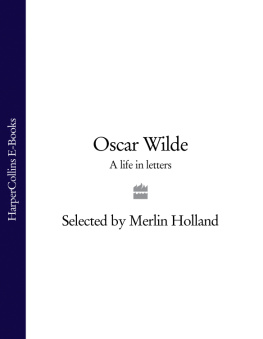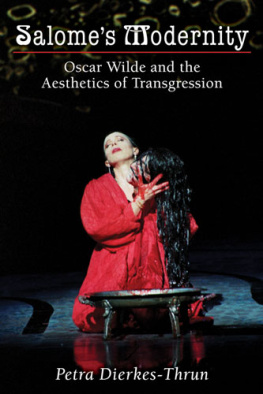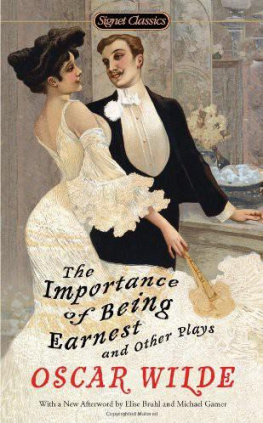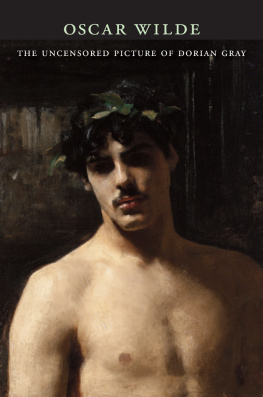THE FALL OF THE HOUSE OF WILDE
To Martin Dewhurst
THE FALL OF THE HOUSE OF WILDE
Oscar Wilde and His Family
Emer OSullivan

Contents
Biographies of Oscar Wilde typically treat him in isolation. He is seen as an outsize personality and everything tends to be reduced to personal terms. What gets overlooked is the vibrant and tumultuous milieu in which he grew up. Oscar was the son of two immense personalities who were at the centre of Irish society. More than most children, he was imbued with the loyalties and loathings of his parents, their politics, their erudition, their humour and, one might add, their predisposition to calamity.
The Fall of the House of Wilde is a diptych of two cultural milieus, Victorian Dublin and fin-de-sicle London, which together explore the story of one family. At a seminal time in Irelands political and social history, Sir William Wilde was one of the initiators of a new vision, rightly called the Celtic Revival. The Celtic Revival as a cultural force is usually attributed to the generation of W. B. Yeats and Douglas Hyde, the first president of Ireland. This overlooks the fact that the revival started two generations earlier, with the collecting, cataloguing and writing of the first history of the countrys antiquities by Sir William Wilde. Establishing the framework for cultural revival was only one of Sir Williams many accomplishments. He was a Victorian polymath a travel writer, archaeologist, ethnologist and, by profession, a scientist and surgeon honoured internationally for his contribution to medicine, science and Celtic history. Above all, he was a genius, thirsting and reckless for knowledge for its own sake and at any cost a Romantic as much as he was a scientist. Biographies have not given him his due. The only biography of Sir William is T. G. Wilsons Victorian Doctor in 1942. As its title suggests, it concentrates on the public man and his medical achievements.
His companion Jane Wilde, ne Elgee, was a bluestocking: a poet, journalist, translator and a public figure in her own right. To her surprise and alarm, she caused a national outrage during Irelands 1848 uprising with her written attacks on the political regime, and was hailed a hero by the Catholic underdogs whose cause she, as a Protestant, was championing. Throughout her life, she spoke of the arrogance of imperialism at a time when it went largely uncontested. Biographies have been written of Jane Wilde and most ridicule her: her political stance derided as militant, her emancipation as a woman frowned upon, her one-liners misunderstood. Not until Mother of Oscar, 1994, by Joy Melville, do we meet her as an intellectual who was one of the most prominent women in nineteenth-century Ireland.
Cultural theorists speak of how significant the family was and often still is in its oppression of women; how hard it is to hear a womans voice within a familial framework that typically privileges a male head. But the Wildes were not a typical patriarchal Victorian family. William and Jane enjoyed a companionate marriage. The Wilde home was one where equality was respected and individuality fostered. The children enjoyed a close friendship with their parents, to whom they were devoted, and were educated at home for the first decade of their lives. Oscar acknowledged his father and his fathers library as the source of all his learning. Oscar and his elder brother, Willie, grew up among their parents friends and profited enormously from an Anglo-Irish circle of loquacious, passionately intellectual people whose chief recreation was conversation. William Wildes weekly suppers were gatherings for national and international scholars, dubbed Athenian symposia for combining liveliness with erudition. Jane Wildes salon at Merrion Square was a city institution, drawing as many as a hundred guests on an afternoon, from all classes. It is to No. 1 Merrion Square we need to look for the formation of Oscars mind, for his love of learning, for his progressiveness, for his drawing-room comedies and their ability, in witty one-liners, to satirise Victorian England.
In many biographies of Oscar Wilde, Jane and William are not given their due. This does not square with the eminence Jane and William enjoyed in Ireland. Neither does it fit with Oscars view of them. Each
of his parents is central to an understanding of his life. Their reputation and importance was a source of great pride to Oscar; it shaped his personal identity, and gave him the authority, confidence and appetite to rise quickly to international fame.
Oscars imprisonment after a sensational trial made the Wilde name unspeakable in many polite circles. It brought his parents reputation into disrepute. They became victims of censorship and their histories went unwritten. Only by knowing the extraordinary achievements of Sir William Wilde, and Jane Wildes prominence in Ireland, can we understand Oscar. Coming from an idyllic home where the children were idolised, he went to enormous lengths to obtain this same central position, the same applause and devout attention in adult life. He was, perhaps, always trying to re-enact his golden childhood.
This biography would not be complete without Willie Wilde. He provides an interesting contrast to Oscar. Equally bright and witty, he never worked out what he wanted to do or how he wanted to live. Renowned for his brilliance, his high spirits, his profligacy and his laziness, over time he became a black sheep. The Wilde name brought expectations he could not meet. Indeed, it seemed as if he were crushed beneath its weight. Yet he might have done so much had things been otherwise.
In the end this book is a narrative, a piece of biographical storytelling. It tries to capture something of human nature and the inner dynamic of a family, its impact on the heart as well as on the mind. But it draws in many other lives, and is interrupted by many episodes of high adventure and mishaps so characteristic of the Wildean spirit. Finally, also, it is an attempt to put Oscar in the context of his family and the family in the larger context of the history of Ireland.
The political and cultural campaign William and Jane fought was fought again years later, in 1916, with bloody results. Ireland did not embrace independence in the way the Wildes had hoped. Instead, Ireland dug in against the British over what was a radically retrogressive period. The victors wrote the history, and the contributions of many eminent mid-century Victorians went unrecognised William Wilde among them. Thus the fall of the Wildes from eminence is emblematic
of the fate suffered by many of the great Irish Protestant dynasties, split emotionally and physically between Ireland and Britain. By the time Sir William died in 1876, the golden age of Irish Protestants had faded. While it was more than a dozen years before Charles Stewart Parnell fell, a generation of eminent Irish Victorians was passing, and many of those coming up chose to live elsewhere. Recovering the lives of these great Irish Victorian families is long overdue.
Emer OSullivan
London, April 2016
William Wilde hailed from a corner of County Roscommon, near Castlerea in the west of Ireland. Had he concerned himself with genealogy, William could have traced his line back to Durham, where his ancestors were builders. But he knew little of the past more remote than his paternal grandfather, Ralph Wilde, who came to Ireland in the early eighteenth century. He worked for Lord Mount Sandford, managing his family estate, Castlerea House, in County Roscommon. Williams maternal ancestors were rooted in the west of Ireland. His grandmother, Margaret OFlynn, was the scion of a prominent old Gaelic family whose ancestors carried enough prestige to have the region called after them. Her marriage to Ralph Wilde might have made tongues wag, as Margaret was marrying down the social ranks. What no one could have doubted, however, was Ralphs entrepreneurial spirit. Over his lifetime, he accumulated sufficient funds to acquire land and become a prosperous landlord.

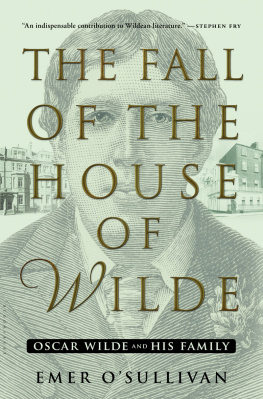
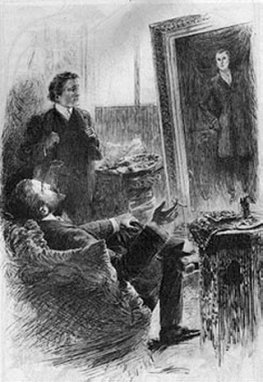
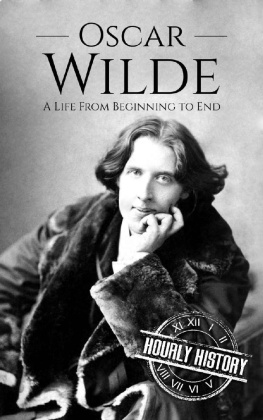

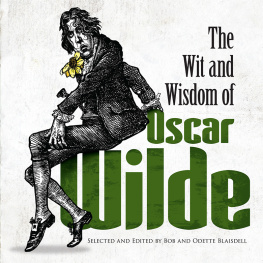
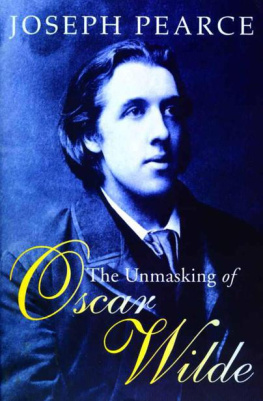
![Wilde Oscar - The secret life of Oscar Wilde: [an intimate biography]](/uploads/posts/book/228457/thumbs/wilde-oscar-the-secret-life-of-oscar-wilde-an.jpg)
